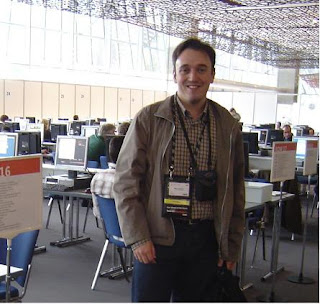TechEd 2006 is officially over (from last friday, that is), and I'm back to work. Just a recap of the final days:
- Day Four, the final day, was a bit weak. It's understandable that, with the speakers tight schedules, most are already on their way home. So I was looking forward to Ingo Rammer's presentation about Optimizing Performance and Scalability as the high point of the day. But, the presentation was very much like last's year, so I switched to SharePoint Server 2007 Search. The latter suffered from the toy example syndrome. It was easy to follow, but very limited, and looked like the most part was getting around some limitations of the API or model.
Next, I attended MSF v4.0 Core by Rafal Lucawiecki. Very good and informative. With the upgrade to MSF 4, and the additions of MSF for agile and CMMI in VSTS, MSF has become more than a Framework. The Core, is the Discipline, from which the families derive (Application Development, Infrastructure Deployment and possibly Consulting and Operations Management - MOF in the future). In it, there's only high level models, with the Team Model revolving around Advocacyand Architecture becoming a phase in the development life cycle.
The Process Model, introduces Governance and Enactement, catering for various types of projects event small teams, and allowing the start of each phase before the end of the previous one. At Core Discipline, the Project Management Discipline recommended is the PMI BOK. At methodology level, there's support for Agile SD and CMMI PI activities and work streams.
To Rafal, the best invention in Software Engineering in the last 20 years, was the "Daily Build", because with it, there is no integration (rephrasing, it's done on a daily basis, so it's easier, cheaper, more predictable, and garantees a working product very early on).
Then there was a session about SQL 2005 Cache Sync/Query notification in Depth by Bob Beauchmin. To sum it up in one sentence:"The feature is only useful in very specific scenarios, the drop-down combo box with few items rarely updated."
Outside that, the feature doesn't scale, or can't be used. The bulk of the session was spent analyzing the limitations imposed on queries, the inner workings of the feature and its integration with ASP.NET Cache. Not very useful.
The final session of TechEd, and because there were two portuguese fellows in the draw, was Iron Architect Finals. This was a contest to define the architecture to build up communities around TechEd, linking to the feedback system. Out of the 5 chosen proposals, 2 were from portuguese people. :)
The jury was composed by Andrew Cheeseman, Ron Jacobs, Beat Schwegler,
Jürgen Pfeifer (MCA), and clearly favoured "Jota"s ideas. From a presentation point of view, the prize would go to the belgian as he was all around at ease. From a pleasing the jury point of view the prize would go the finn/dannish "alpha geek" guy that presented last and tried to score points by pleasing the jury. But judging only the ideas (tag clouds to categorize sessions and attendees), forgetting the nervous presentation, "Jota" was better. And so, congratulations to "Jota", and I expect that he may become the first portuguese MCA. - Day three, was very varied. To start off, I watched an indepth look at Linq for SQL (that's the current name of DLinq), and it was astonishing. Very easy and very powerful, and overall very well thought out solution. Even the corner cases of ORM tools were covered: identity mapping, lazy loading, optimistic concurrency, paging, batch commands, you name it.
Then another cool session about Iron Python, and it's fit within .NET. The demos were very impressive (animating Merlin, converting from Ink to text, synthetizing speech, using WPF, with every demo below 5 lines), and there is now support for Iron Python in ASP.NET (not MS PSS support, but community support) and the tools are being extended to support Python (Intelli sense wasn't prime time yet) and other scripting languages.
After that, I attended a real world usage example of WPF in the Zurich Airport Monitoring system. Very impressive the animation capabilities of WPF. In less than 15 minutes there was a button animated to follow a path (later replaced by an airplane) in the map that represents the airport. From there on, it was just a matter of refinement and linking the actions on event handlers with code from the Expression Designer, to get a fully animated monitoring system (with tracks sensing the number of planes and glowing in red), with zoom, panning, tags on airplanes.
The presentation of Team System adoption best practices focused on advanced customizations and extensibility possibilities, and that didn't please some of the crowd in the room that were expecting the basics (how to organize SS, work items, ...). But the customizations were very useful (capture the screen and pre-fill a bug with that attachment, to save testers some keystrokes; changing the type of the description field to HTML; searching all pending check-ins from all users; and because of the annoyance from some people in the audience, information about licensing conditions, the reports generated, the off-line scenario).
Last, Friz Onion compaired the differences between the Web site model and Web Application Project, the strengths and weaknesses of each, with a clear win for Web Application Projects. Very detailed knowledge of the inner workings of ASP.NET, the compilation mechanism and the class model relationships.

No comments:
Post a Comment